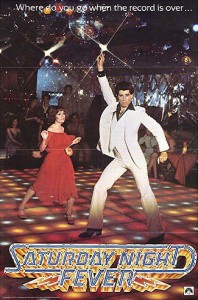Several decades ago, Manhattan had a cachet the other boroughs didn’t enjoy, and bridge-and-tunnelers, as they were called, had one strike against them based on their home address. But during the 1970s, when class was a real and palpable thing in NYC, the outsiders from the outer boroughs began storming the city on Saturday nights and made it their own with the help of leisure suits and strobe lights. Nik Cohn captured the class consciousness of the city’s disco revolution in “Tribal Rites of a New Saturday Night,” an article in the June 7, 1976 issue of New York magazine, although he later acknowledged falsifying facts. At any rate, it became the basis of Saturday Night Fever, and that sensation made disco explode all over again. The opening of Cohn’s article:
“Within the closed circuits of rock & roll fashion, it is assumed that New York means Manhattan. The center is everything, all the rest irrelevant. If the other boroughs exist at all, it is merely as a camp joke—Bronx-Brooklyn-Queens, monstrous urban limbo, filled with everyone who is no one.
In reality, however, almost the reverse is true. While Manhattan remains firmly rooted in the sixties, still caught up in faction and fad and the dreary games of decadence, a whole new generation has been growing up around it, virtually unrecognized. Kids of sixteen to twenty, full of energy, urgency, hunger. All the things, in fact, that the Manhattan circuit, in its smugness, has lost.
They are not so chic, these kids. They don’t haunt press receptions or opening nights; they don’t pose as street punks in the style of Bruce Springsteen, or prate of rock & Rimbaud. Indeed, the cults of recent years seem to have passed them by entirely. They know nothing of flower power or meditation, pansexuality, or mind expansion. No waterbeds or Moroccan cushions, no hand-thrown pottery, for them. No hep jargon either, and no Pepsi revolutions. In many cases, they genuinely can’t remember who Bob Dylan was, let alone Ken Kesey or Timothy Leary. Haight Ashbury, Woodstock, Altamont—all of them draw a blank. Instead, this generation’s real roots lie further back, in the fifties, the golden age of Saturday nights.
The cause of this reversion is not hard to spot. The sixties, unlike previous decades, seemed full of teenage money. No recession, no sense of danger. The young could run free, indulge themselves in whatever treats they wished. But now there is shortage once more, just as there was in the fifties. Attrition, continual pressure. So the new generation takes few risks. It goes through high school, obedient; graduates, looks for a job, saves and plans. Endures. And once a week, on Saturday night, its one great moment of release, it explodes.” (Thanks to The Electric Typewriter.)
••••••••••
Steve Rubell tries to cash in with an album called A Night at Studio 54:
Tags: Nik Cohn, Steve Rubell

